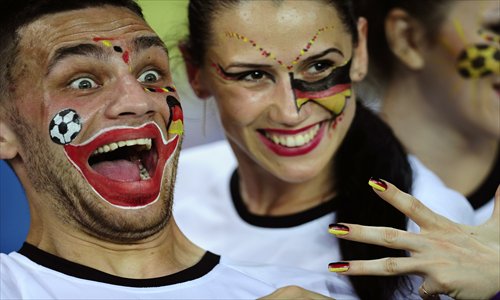Dueling neighbors

Russia vs. Poland, England vs. France. Germany vs. the Netherlands. The opening phase rivalries at Euro 2012 stretch back over the decades in both geopolitical and sporting terms.
On Wednesday, Germany took a big step toward the quarterfinals when two classy first-half strikes from Mario Gomez secured a 2-1 victory over the Netherlands who are in serious danger of elimination.
A majestic goal in the 73rd minute from Robin van Persie gave the Dutch a fighting chance in the latter stages but they looked physically spent having been forced to chase the game after falling behind.
Joachim Loew's Germany will qualify as group winners if they draw or win their final match against Denmark in Lviv and they are shaping up nicely for a push for a fourth European title.
Sport warfare
Wednesday's meeting between two of Europe's most fluent sides - three-times winner Germany and 1988 champions the Netherlands - is arguably the most intense rivalry of all, going back to their meeting in the 1974 World Cup final.
Then, the Germans won on home soil but on the pitch, the bruised pride of conflicts past can be assuaged.
Prussian military strategist Carl von Clausewitz insisted in his day that "war is merely the continuation of policy by other means", whereas international sport, in the well-worn words of British writer George Orwell, is "war minus the shooting".
Less discussed today is the "1984" and "Animal Farm" author's parallel assertion in his 1945 article The Sporting Spirit, published in the left-wing magazine Tribune, that "serious sport has nothing to do with fair play."
Even the toughest tacklers on the brawniest team might not necessarily go that far but where the Germans and the Dutch are concerned, their meetings could hardly be confused with a reunion of old friends.
Germany defender Mats Hummels said before the match that the Dutch would be fighting for their lives to qualify from the "Group of Death," not just because they are taking on an old enemy and neighbor buoyed by a win over Portugal but after their shocking loss to Denmark.
"There is a huge history and a healthy rivalry between the two nations, so either team will have to give 100 percent, they have to win and we want to secure our passage to the quarterfinals," he said.
In soccer terms there is little to choose between two sides, who between them won 19 out of 20 qualifiers, with Holland's only loss coming to Sweden after they had already secured their passage to Poland and Ukraine.
But this is a fixture which transcends soccer - especially for the Dutch, who were occupied by Nazi German forces for five years during World War II.
Two games in particular demonstrated how, sometimes, the past is not a foreign country but cannot entirely be buried even by the passage of time.
After their 1974 World Cup final loss, the Dutch, who had been expected to win even though the Germans were the competition hosts, felt desolate, midfielder Wim van Hanegem in particular.
"I am full of angst. I hate them," he said about losing his relatives during the war.
In later years, van Hanegem would modify those sentiments but the hatred was still not far below the surface 14 years later when the Dutch, en route to winning their only continental title to date, knocked the German tournament hosts out of Euro 1988.
On that occasion, banners could be seen in the stands in Hamburg reading "Grandma, I found your bike" - an allusion to the fact that Nazi troops confiscated bikes during the occupation.
After the stalemate in the 1978 World Cup, when Holland lost in the final to hosts Argentina, Germany beat their rivals on the way to lifting the European Championship in 1980 but that game was marred by some ugly challenges.
"They hate us so much more than we hate them," lamented German midfield star Karl-Heinz Foerster.
But, 33 years after World War II ended, 1988 in Hamburg was a sporting liberation for the Dutch, who then conquered the Soviet Union in the final.
"I am happy I could give this gift to the older generation, the ones that lived through the war," stated Dutch keeper Hans van Breukelen.
Bitter reunion
At that time, coach Rinus Michels told fans, "We won the tournament but we all know that the semifinal was the real final."
The ill-feeling still persisted through to the 1990 World Cup when both sets of fans jeered each other's anthems before German striker Rudi Voeller and Dutch midfielder Frank Rijkaard were sent off and Voeller then spat at his rival.
Time has healed some wounds, coinciding with some relatively unsuccessful German teams giving their fans little to crow about.
German singer Mickie Krause, though, raised a few heckles with a recent song which translates as only the trash collectors wear orange - an indirect jibe at Holland's famous kit.
Nonetheless, after losing to the Danes the Dutch are only too painfully well aware that after losing to Germany, they could be going home early. And if there was one team they did not want to lose to, it definitely was Germany.